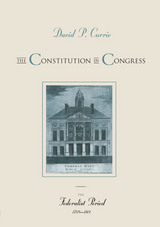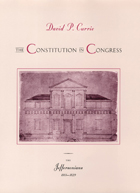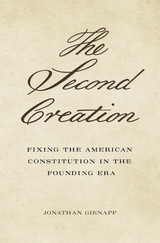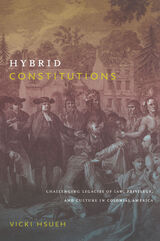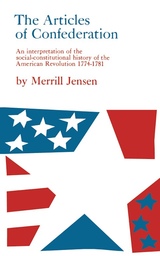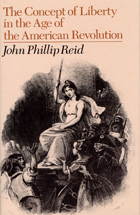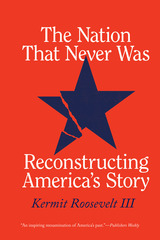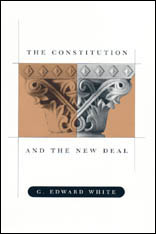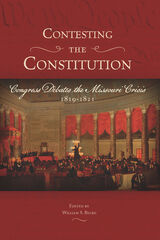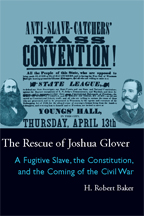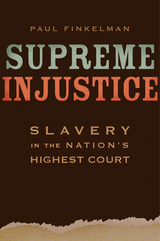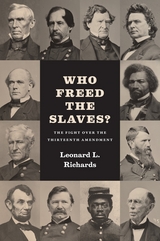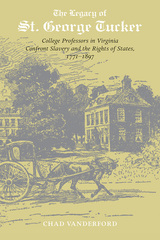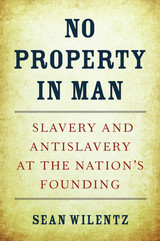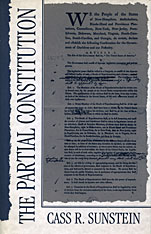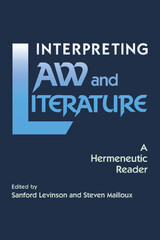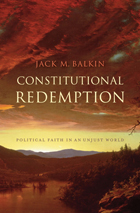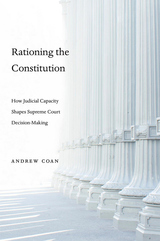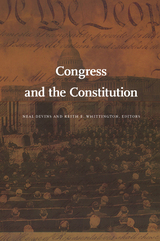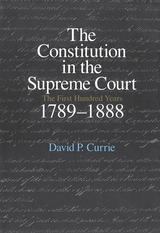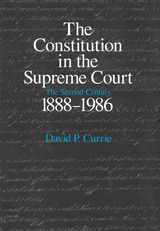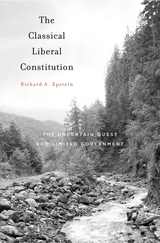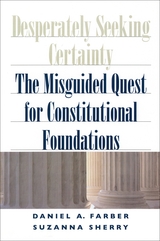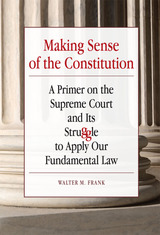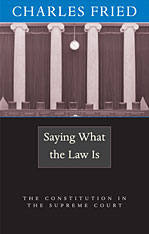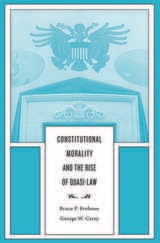The Legacy of St. George Tucker: College Professors in Virginia Confront Slavery and Rights of States, 1771–1897
University of Tennessee Press, 2015
Cloth: 978-1-62190-216-4 | eISBN: 978-1-62190-217-1
Library of Congress Classification KF4545.S5V358 2015
Dewey Decimal Classification 342.73087
Cloth: 978-1-62190-216-4 | eISBN: 978-1-62190-217-1
Library of Congress Classification KF4545.S5V358 2015
Dewey Decimal Classification 342.73087
ABOUT THIS BOOK | AUTHOR BIOGRAPHY | REVIEWS
ABOUT THIS BOOK
“In The Legacy of St. George Tucker, Chad Vanderford provides a cogent longitudinal explication of how Virginia intellectuals constructed and defined proslavery ideology and state rights. He reminds twenty-first-century readers that in order to judge late-eighteenth-and early-nineteenth-century thinkers fairly, they must position basic political ideas within the context of their day, not ours. Vanderford’s book will prove valuable not only for students and researchers of political theory, but also of southern intellectual life and the political worlds of the Colonial, Early National, and Old South.”
–John David Smith, Charles H. Stone Distinguished Professor of American History, University of North Carolina at Charlotte
Historians born during and after the Civil Rights movement have struggled to take the proslavery and pro-secession arguments of the eighteenth- and nineteenth-century South seriously. They generally tend to lump the two theories together as components of one ideology and then attempt to write it out of the political norms of American life. In this groundbreaking study, Vanderford isolates the different ideological strands in southern political thought of this era and works to understand these ideas in the context of their time.
St. George Tucker (1752–1827), Founding Father, professor, and political theorist, saw clearly that slavery runs against the grain of the values articulated in the Declaration of Independence. Under certain narrowly construed circumstances, however, he thought it necessary to tolerate slavery. He viewed secession as an extreme step, but one that the Declaration of Independence left open as a possibility for all free states.
St. George Tucker’s arguments hinged on a modern view of natural right that builds on the premise that political power can only be legitimate if it rests on the consent of the governed. He believed that equally free and independent individuals constructed a voluntary union of equally free and independent states. His son Henry Tucker (1780–1848), and grandson, John Randolph Tucker (1823–1897) sought to defend this ideology of modern natural right against fellow professors, North and South, who tended to replace it with the ancient ideology of natural right: the view that wisdom gives one the title to command. Many southern intellectuals came to believe that individuals are not equally free and independent by nature; many northerners came to argue that the states had never been equally free and independent. These disagreements contributed to the outbreak of the Civil War.
At once a work of intellectual history that shows the key role played by professors in helping to formulate southern ideology, as well as a recovery of rarely explored arguments, this work wrestles with one of the greatest challenges of intellectual history: the effort to understand the most controversial ideas of the past on their own terms, while searching for the genealogy that connects the past to the present.
CHAD VANDERFORD is an associate professor of history at the University of Texas of the Permian Basin. His articles and reviews have appears in publications including Civil War History, the Journal of Southern History, and the Virginia Magazine of History and Biography.
–John David Smith, Charles H. Stone Distinguished Professor of American History, University of North Carolina at Charlotte
Historians born during and after the Civil Rights movement have struggled to take the proslavery and pro-secession arguments of the eighteenth- and nineteenth-century South seriously. They generally tend to lump the two theories together as components of one ideology and then attempt to write it out of the political norms of American life. In this groundbreaking study, Vanderford isolates the different ideological strands in southern political thought of this era and works to understand these ideas in the context of their time.
St. George Tucker (1752–1827), Founding Father, professor, and political theorist, saw clearly that slavery runs against the grain of the values articulated in the Declaration of Independence. Under certain narrowly construed circumstances, however, he thought it necessary to tolerate slavery. He viewed secession as an extreme step, but one that the Declaration of Independence left open as a possibility for all free states.
St. George Tucker’s arguments hinged on a modern view of natural right that builds on the premise that political power can only be legitimate if it rests on the consent of the governed. He believed that equally free and independent individuals constructed a voluntary union of equally free and independent states. His son Henry Tucker (1780–1848), and grandson, John Randolph Tucker (1823–1897) sought to defend this ideology of modern natural right against fellow professors, North and South, who tended to replace it with the ancient ideology of natural right: the view that wisdom gives one the title to command. Many southern intellectuals came to believe that individuals are not equally free and independent by nature; many northerners came to argue that the states had never been equally free and independent. These disagreements contributed to the outbreak of the Civil War.
At once a work of intellectual history that shows the key role played by professors in helping to formulate southern ideology, as well as a recovery of rarely explored arguments, this work wrestles with one of the greatest challenges of intellectual history: the effort to understand the most controversial ideas of the past on their own terms, while searching for the genealogy that connects the past to the present.
CHAD VANDERFORD is an associate professor of history at the University of Texas of the Permian Basin. His articles and reviews have appears in publications including Civil War History, the Journal of Southern History, and the Virginia Magazine of History and Biography.
See other books on: 18th Century | Constitutional law | Legacy | Natural Law | Virginia
See other titles from University of Tennessee Press

